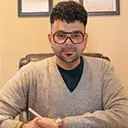Your hair health plays a crucial role in defining your overall appearance. While hair care products can help, providing our hair with vitamins and nutrients is the secret to avoiding hair loss and promoting hair growth. In our fast-paced lives, it’s easy to overlook essential nutrients that promote healthy hair growth.
We often focus on external treatments, but what about nurturing our hair from within? Let’s delve into the world of vitamins for hair growth and explore how these simple supplements can help you attain healthy hair.
Do hair vitamins work?
Hair vitamins can be beneficial for improving the overall health and condition of your hair. They contain essential nutrients like biotin, vitamin C, and zinc, supporting hair growth and strength. While results may vary from person to person, many users report positive outcomes such as increased hair thickness and reduced breakage after consistent use of hair vitamins.
How long does it take for hair vitamins to work?
The effectiveness of hair vitamins varies depending on individual factors such as diet, lifestyle, and existing nutrient deficiencies. Generally, it may take a few weeks to a few months(2 – 6 months) to notice visible improvements in your hair’s health and appearance after starting a regular regimen of taking hair vitamins. A consistent intake of vitamins is the only way to see the results.
Best Vitamins For Hair Growth
When it comes to achieving the healthy hair you need, the role of vitamins in promoting hair growth cannot be overstated. Research has highlighted several essential vitamins crucial in maintaining healthy hair and supporting its development. Let’s delve into the best vitamins for hair growth and explore how you can incorporate them into your daily routine for optimal results.
Vitamin A
Vitamin A aids in the production of sebum, an oily substance that moisturizes the scalp and keeps hair healthy. Retinoic acid helps in cell growth, including the cells that make up hair follicles.
The amount of retinol equivalents needed per day for an adult is 700 Micrograms of retinol activity equivalents (RAE) for males & 600 Micrograms of retinol activity equivalents (RAE) for Women. You can get this by eating kale, sweet potatoes, carrots, spinach, and vitamin A supplements.
Biotin (Vitamin B7,vitamin H, coenzyme R)
Biotin is a water-soluble vitamin essential for producing keratin, a protein that makes up hair strands. Research suggests that biotin supplementation can help improve hair strength and stimulate growth.
You can increase your Biotin intake through foods like eggs, nuts, fish, meat, legumes, avocados, and sweet potatoes.
Vitamin C
Vitamin C is a powerful antioxidant that helps protect hair follicles from damage caused by free radicals. It also aids in collagen production, essential for strong and healthy hair. This Promotes hair health and reduces hair loss.
Incorporate Vitamin C into your diet through citrus fruits like avocados, tomatoes, oranges, strawberries, bell peppers, and kiwi.
Vitamin D
Vitamin D plays a vital role in the anagen phase of hair growth. It helps in hair follicle cycling and may help stimulate hair growth. According to research done by NLM, the average amount of vitamin D intake you need daily is between 30 to 60 nanograms per milliliter(ng/ml).
Spend time outdoors to allow your skin to produce Vitamin D when exposed to sunlight naturally. However, too much exposure to the sun will lead to skin damage. Applying sunscreen is a good option. You can also find Vitamin D in the foods below fatty fish, mushrooms, and fortified dairy products.
Vitamin E
Vitamin E is known for its antioxidant properties, which help reduce oxidative stress on the scalp. This vitamin promotes blood circulation, ensuring the scalp receives adequate nourishment for healthy hair growth.
Incorporate sources of Vitamin E into your diet, such as almonds, sunflower oils, spinach, and avocados.
What vitamin deficiency causes hair loss?
- One common deficiency linked to hair loss is vitamin D. This vitamin is crucial for hair follicle cycling and can lead to excessive shedding when levels are low.
- Vitamin A is another essential nutrient for healthy hair growth, but an excess can contribute to hair loss. Biotin, a B vitamin, is often associated with promoting strong and healthy hair as it plays a crucial role in keratin production.
- Iron deficiency or anemia can also cause hair loss, as iron is necessary to grow and maintain hair cells properly.
- Zinc deficiency has also been linked to alopecia (hair loss) due to its role in DNA and RNA production, which are crucial for healthy cell division.
- Inadequate levels of vitamin E may result in poor blood circulation, which can impact the health of the scalp and hair follicles.
Takeaway
It’s essential to maintain a balanced diet rich in vitamins and minerals to support overall health, including the health of your hair. If experiencing significant or prolonged hair loss, it’s advisable to consult with an Agelock skin clinic for proper diagnosis, medications, and treatment options tailored to individual needs.
Frequently asked question
Natural supplements such as collagen keratin, vitamins like A, C, E, and D, and Healthy lifestyle habits, including a balanced diet, regular exercise, and proper hydration, also improve hair health.
While results vary, hair pills may promote hair growth and thickness by providing essential nutrients. Before trying them, consult a healthcare professional for personalized advice. Remember, individual responses to supplements can differ, so be patient and consistent with usage to see potential benefits.
While some claim Biotin supplements enhance hair health and promote growth, scientific evidence is mixed. Biotin supports overall health, including skin and nails, but its direct impact on hair growth varies among individuals. You must consult a dermatologist to examine whether biotin works for you.



